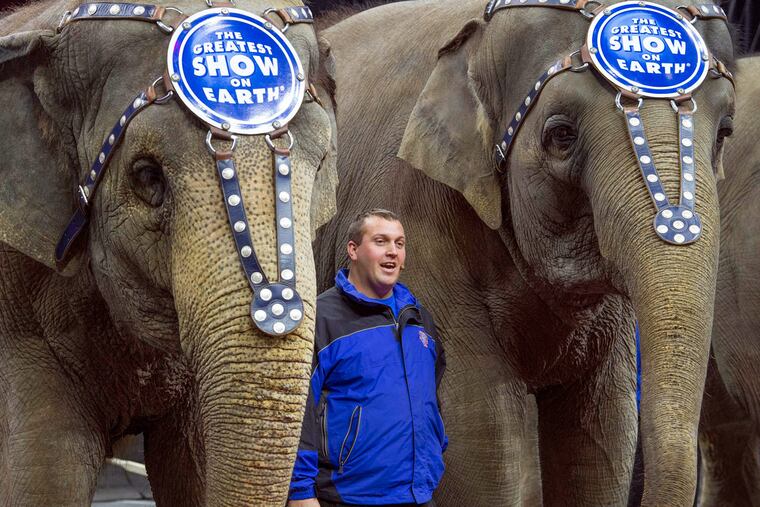For Ringling Bros. elephants, one last tour
Animal-rights activists standing watch this weekend at the Broad Street entrance to the Wells Fargo Center were unsuccessful at keeping Ringling Bros. and Barnum & Bailey Circus showgoers at bay.

Animal-rights activists standing watch this weekend at the Broad Street entrance to the Wells Fargo Center were unsuccessful at keeping Ringling Bros. and Barnum & Bailey Circus showgoers at bay.
The protesters held well-worn signs warning "Animal Abuse Inside," "Caged for Life" and "Wild Animals Belong in the Wild" - most directing the inquisitive to visit circuses.com, which actually links to the People for the Ethical Treatment of Animals.
"Those with tickets are still driving in," admitted Camden-based sign-toter Brian Foglia, sporting a Cumberland Valley SPCA logo on his jacket. "But some just driving by are honking and giving us a 'thumbs up.' "
Still, there was compelling evidence inside the arena that the activists had finally won a major victory: The herd of female Asian elephants that are a centerpiece and iconic symbol of the Ringling Bros. circus ambled through their routines for Philly showgoers for the very last times.
Come May 1, all elephants will be retired from both the Red ("Xtreme") and Blue ("Legends") troupes of the circus, ending a Ringling Bros. tradition that "traces back 145 years," according to elephant trainer Joseph "Joey" Frisco III.
In fact, the history harks back even further with this long amalgamated circus, if you start with the 1796 import of what was reputedly the very first elephant to appear in the United States since the last Ice Age - then later put into the circus started by 19th-century farmer Hachaliah Bailey.
"It's a bittersweet thing," sighed Frisco, a third-generation trainer, during a pre-show interview. "Our elephants will be settled permanently at our Center for Elephant Conservation, a 200-acre facility in Polk City, Fla., to frolic in the sun, breed, and help out with cancer research." (Elephant blood is rich in a cancer-attacking gene, TP-53, also found in human blood, but in much smaller percentages.)
"I've never seen a human or an animal who ever complains about going to Florida to retire," Frisco quipped. "This is history changing, though. Ringling Bros. will be fine. They'll continue to adapt, come up with something different and extraordinary. So it will always be 'The Greatest Show on Earth.' But P.T. Barnum said it best - 'When you want to entertain a crowd, have an elephant.' "
Circus buff and Bellmawr, N.J., native Christine Iacovone and her 8-year-old daughter Jordyn, in attendance at the morning performance, heartily agreed.
"If it wasn't for the elephants we wouldn't have come," said Iacovone, who traces her love of pachyderms "to the little circuses with an elephant that came to my hometown when I was a child."
Her daughter - a second-time Ringling circus goer - marveled at "how intelligent they are. It's really amazing to see. We also went to the pre-show event and watched Kelly Ann" - the unofficial lead elephant in the troupe - "paint a picture."
In the lobby, elephant-themed trinkets were moving briskly at souvenir stands. Reproductions of vintage circus posters featuring elephants were sold out.
In the center ring, as "the most majestic of all creatures on the face of the earth" pranced and danced, the master of cermonies, Johnathan Lee Iverson, talked about how well-treated the brood is, each eating 150 pounds of vegetarian grub a day, enjoying plenty of exercise out of the ring, and living well into their 60s or early 70s - 20 years beyond the normal life span of an elephant in captivity.
Other circuses, such as the Big Apple, and zoos, such as Philadelphia's, have voluntarily opted out on elephants in the last decade, acknowledging their restricted confines and protests of community groups.
And the Feld Organization, which runs the Ringling Bros. circus, and lots of other touring arena properties, did pay a record $270,000 fine in 2011 for violations of the Animal Welfare Act.
But other lawsuits brought by activists to end elephant servitude have gone in Ringling's favor.
On the political/legislative front, though, the loud and social media-adept "ban the elephants" movement has been steadily building momentum, hurting the Ringling circus in the pocketbook.
"Laws are now or about to go into effect in five or six cities we regularly play - including Los Angeles and Oakland in California; Austin, Texas; Asheville, N.C., and Richmond, Va. - that put road blocks in our way, that restrict the way we transport, house and work the elephants and shackle them for the safety," Frisco said.
So that's the straw that's broken the elephant acts' back - though not that of the lions, tigers, horses, dogs, lhamas, pigs, goats and, yes, camels which are still frolicking in a Ringling circus, and which activists such as Foglia are "going after next," he said.
"[But] if they take them away, that would really be the end of the circus," noted showgoer Brian Pollock of Churchville.
215-854-5960 @JTakiff